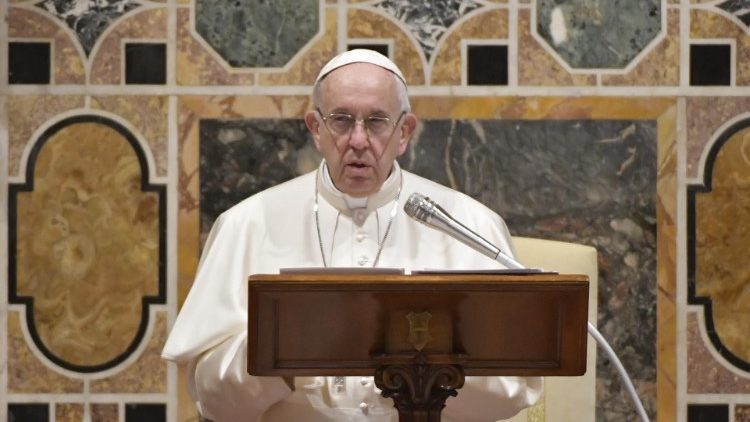Pope Francis marked New Year’s Day, January 1, also World Day of Peace, with an address to the diplomatic corps that warned against the rise of nationalism around the world. In Sight magazine:
“The reappearance of these impulses today is progressively weakening the multilateral system, resulting in a general lack of trust, a crisis of credibility in international political life, and a gradual marginalisation of the most vulnerable members of the family of nations,” he said…
The Pope said it was troubling to see the re-emergence of tendencies “to impose and pursue individual national interests without having recourse to the instruments provided by international law for resolving controversies and ensuring that justice is respected, also through international courts”.
“Such an attitude is at times the result of a reaction on the part of government leaders to growing unease among the citizens of not a few countries, who perceive the procedures and rules governing the international community as slow, abstract and ultimately far removed from their own real needs,” he said.
While noting that it was fitting political leaders “listen to the voices of their constituencies and seek concrete solutions to promote their greater good”, he added: “Yet this demands respect for law and justice both within their national communities and within the international community, since reactive, emotional and hasty solutions may well be able to garner short-term consensus, but they will certainly not help the solution of deeper problems; indeed, they will aggravate them…Politics must be farsighted and not limited to seeking short-term solutions.”
The New York Times:
Francis did not cite specific countries in his speech, delivered to diplomats at the Holy See, but he appeared to be lamenting the mix of jingoism and isolationism that has emerged in the United States and in European nations where populist governments have risen to power.
Noting that the League of Nations, established after World War I, had failed to head off another war largely because countries were not willing to work together, Francis raised the specter of fresh violence.
“The same attitudes are presently threatening the stability of the major international organizations,” he said, urging Europeans in particular to remain united in the face of “temptation to erect new curtains.”
From Reuters:
Populist anti-immigrant parties made gains in a number of countries last year, including Italy, France, the Netherlands, Hungary, Brazil and Poland.
In the United States, a partial government shutdown entered its third week as President Donald Trump has pledged not to bend in his demand for a wall along the southern border with Mexico..
In his hour-long speech, Francis several times mentioned the League of Nations, which was set up after World War One to promote peace but failed to stop the nationalist and populist movements that helped lead to World War Two.
The Pope’s address touched on specific issues including immigration, nuclear weapons, climate change and the sex scandals inside the Catholic Church:
Francis praised the United Nations’ Global Compact on Migration, which set objectives for how the movement of people can be managed. The United States, Italy, Hungary and Poland are among nations that boycotted the meeting in Morocco last year.
The pope again condemned the arms trade and possession of nuclear weapons, lamenting that past efforts at nuclear disarmament had given way to “the search for new and increasingly sophisticated and destructive weapons”.
He called for a more decisive commitment to combating global warming and for “rethinking our relationship with our planet”.
Calling sexual abuse of children “one of the plagues of our time”, he said a meeting of key bishops at the Vatican in February would aim to “shed full light on the facts and to alleviate the wounds caused by such crimes”.
The transcript of his “state of the world” address can be found on the Vatican News site.
Image from Vatican Media.

